Asset Protection: The Cornerstone of Successful Security Operations
VerifiedAdded on 2022/03/21
|14
|4117
|26
Essay
AI Summary
This essay provides a comprehensive analysis of asset protection within the context of national security. It begins by outlining the various threats faced by the United States, including hostile foreign governments, cybercrime, and natural disasters, emphasizing the importance of strategic security. The essay then delves into the concept of protection operations, highlighting the roles of the Department of Homeland Security (DHS), counterterrorism strategies, and the significance of intelligence gathering. The core argument revolves around the essentiality of asset protection as the critical element in any successful protection operation, defining assets broadly and tracing the historical evolution of asset protection strategies. The essay also underlines the importance of historical analysis in improving current security measures and concludes by emphasizing the need for collaboration between local, state, and federal forces to counter threats effectively. The paper also provides a detailed overview of the intelligence cycle and various agencies involved in counterterrorism such as the FBI and NCTC.
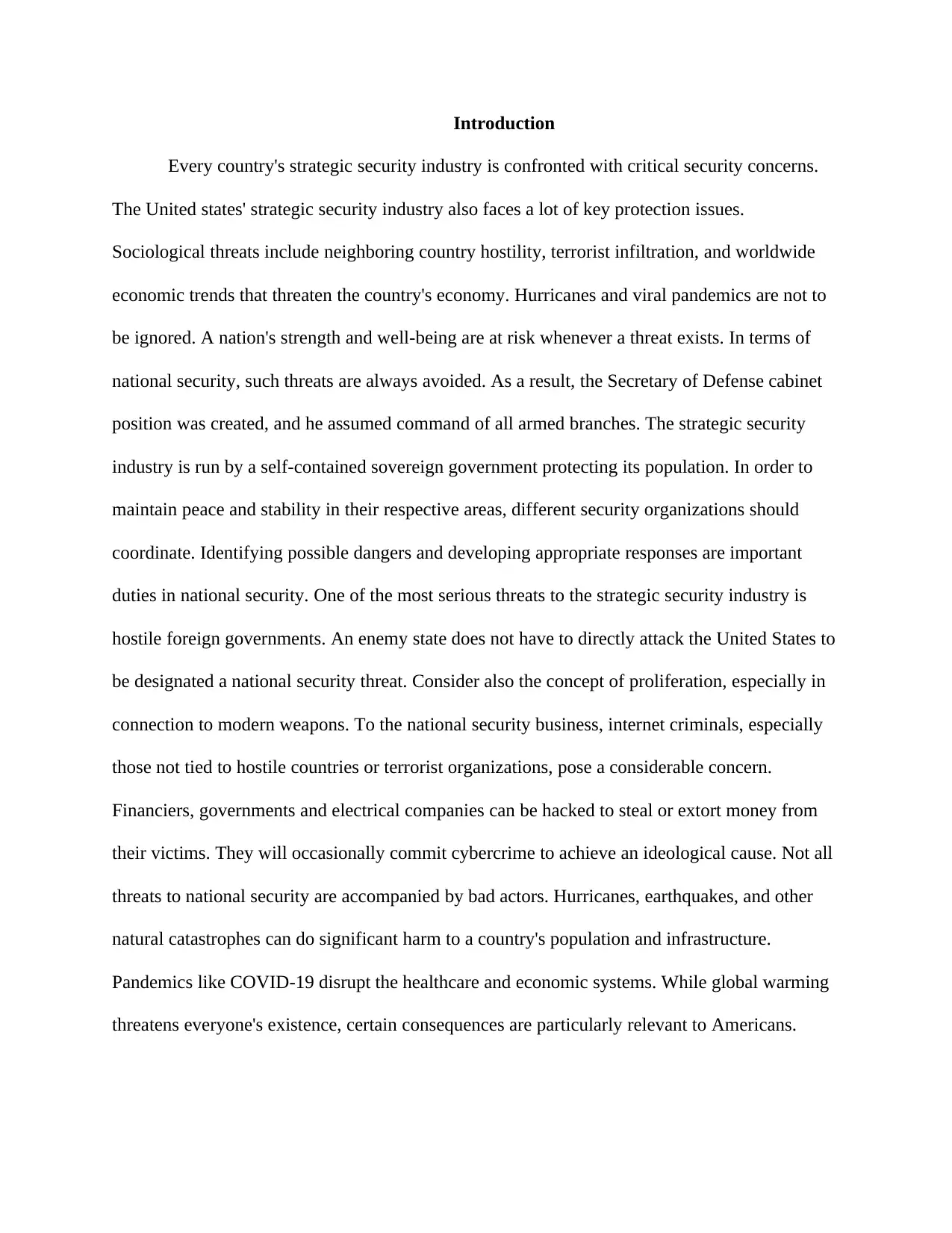
Introduction
Every country's strategic security industry is confronted with critical security concerns.
The United states' strategic security industry also faces a lot of key protection issues.
Sociological threats include neighboring country hostility, terrorist infiltration, and worldwide
economic trends that threaten the country's economy. Hurricanes and viral pandemics are not to
be ignored. A nation's strength and well-being are at risk whenever a threat exists. In terms of
national security, such threats are always avoided. As a result, the Secretary of Defense cabinet
position was created, and he assumed command of all armed branches. The strategic security
industry is run by a self-contained sovereign government protecting its population. In order to
maintain peace and stability in their respective areas, different security organizations should
coordinate. Identifying possible dangers and developing appropriate responses are important
duties in national security. One of the most serious threats to the strategic security industry is
hostile foreign governments. An enemy state does not have to directly attack the United States to
be designated a national security threat. Consider also the concept of proliferation, especially in
connection to modern weapons. To the national security business, internet criminals, especially
those not tied to hostile countries or terrorist organizations, pose a considerable concern.
Financiers, governments and electrical companies can be hacked to steal or extort money from
their victims. They will occasionally commit cybercrime to achieve an ideological cause. Not all
threats to national security are accompanied by bad actors. Hurricanes, earthquakes, and other
natural catastrophes can do significant harm to a country's population and infrastructure.
Pandemics like COVID-19 disrupt the healthcare and economic systems. While global warming
threatens everyone's existence, certain consequences are particularly relevant to Americans.
Every country's strategic security industry is confronted with critical security concerns.
The United states' strategic security industry also faces a lot of key protection issues.
Sociological threats include neighboring country hostility, terrorist infiltration, and worldwide
economic trends that threaten the country's economy. Hurricanes and viral pandemics are not to
be ignored. A nation's strength and well-being are at risk whenever a threat exists. In terms of
national security, such threats are always avoided. As a result, the Secretary of Defense cabinet
position was created, and he assumed command of all armed branches. The strategic security
industry is run by a self-contained sovereign government protecting its population. In order to
maintain peace and stability in their respective areas, different security organizations should
coordinate. Identifying possible dangers and developing appropriate responses are important
duties in national security. One of the most serious threats to the strategic security industry is
hostile foreign governments. An enemy state does not have to directly attack the United States to
be designated a national security threat. Consider also the concept of proliferation, especially in
connection to modern weapons. To the national security business, internet criminals, especially
those not tied to hostile countries or terrorist organizations, pose a considerable concern.
Financiers, governments and electrical companies can be hacked to steal or extort money from
their victims. They will occasionally commit cybercrime to achieve an ideological cause. Not all
threats to national security are accompanied by bad actors. Hurricanes, earthquakes, and other
natural catastrophes can do significant harm to a country's population and infrastructure.
Pandemics like COVID-19 disrupt the healthcare and economic systems. While global warming
threatens everyone's existence, certain consequences are particularly relevant to Americans.
Paraphrase This Document
Need a fresh take? Get an instant paraphrase of this document with our AI Paraphraser
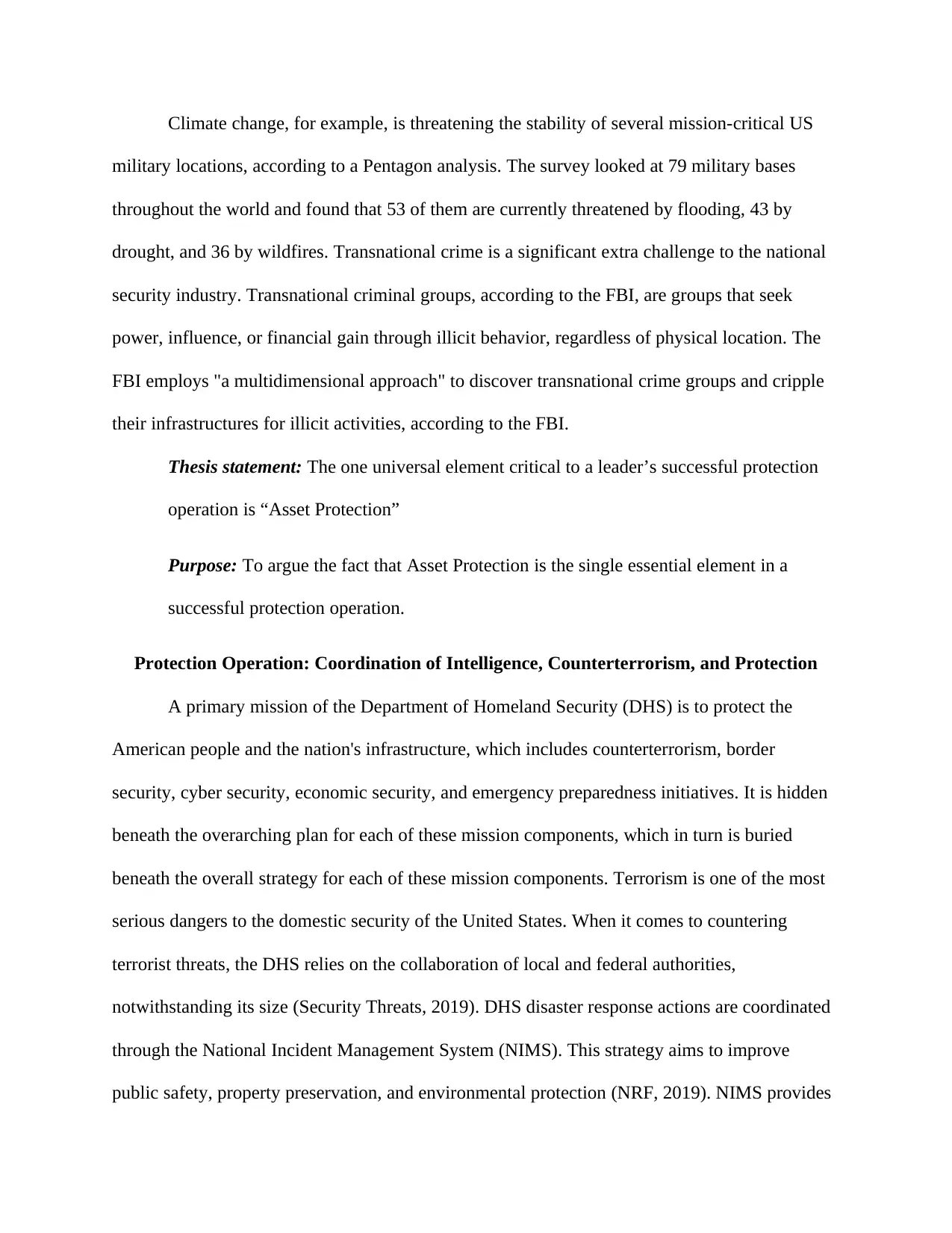
Climate change, for example, is threatening the stability of several mission-critical US
military locations, according to a Pentagon analysis. The survey looked at 79 military bases
throughout the world and found that 53 of them are currently threatened by flooding, 43 by
drought, and 36 by wildfires. Transnational crime is a significant extra challenge to the national
security industry. Transnational criminal groups, according to the FBI, are groups that seek
power, influence, or financial gain through illicit behavior, regardless of physical location. The
FBI employs "a multidimensional approach" to discover transnational crime groups and cripple
their infrastructures for illicit activities, according to the FBI.
Thesis statement: The one universal element critical to a leader’s successful protection
operation is “Asset Protection”
Purpose: To argue the fact that Asset Protection is the single essential element in a
successful protection operation.
Protection Operation: Coordination of Intelligence, Counterterrorism, and Protection
A primary mission of the Department of Homeland Security (DHS) is to protect the
American people and the nation's infrastructure, which includes counterterrorism, border
security, cyber security, economic security, and emergency preparedness initiatives. It is hidden
beneath the overarching plan for each of these mission components, which in turn is buried
beneath the overall strategy for each of these mission components. Terrorism is one of the most
serious dangers to the domestic security of the United States. When it comes to countering
terrorist threats, the DHS relies on the collaboration of local and federal authorities,
notwithstanding its size (Security Threats, 2019). DHS disaster response actions are coordinated
through the National Incident Management System (NIMS). This strategy aims to improve
public safety, property preservation, and environmental protection (NRF, 2019). NIMS provides
military locations, according to a Pentagon analysis. The survey looked at 79 military bases
throughout the world and found that 53 of them are currently threatened by flooding, 43 by
drought, and 36 by wildfires. Transnational crime is a significant extra challenge to the national
security industry. Transnational criminal groups, according to the FBI, are groups that seek
power, influence, or financial gain through illicit behavior, regardless of physical location. The
FBI employs "a multidimensional approach" to discover transnational crime groups and cripple
their infrastructures for illicit activities, according to the FBI.
Thesis statement: The one universal element critical to a leader’s successful protection
operation is “Asset Protection”
Purpose: To argue the fact that Asset Protection is the single essential element in a
successful protection operation.
Protection Operation: Coordination of Intelligence, Counterterrorism, and Protection
A primary mission of the Department of Homeland Security (DHS) is to protect the
American people and the nation's infrastructure, which includes counterterrorism, border
security, cyber security, economic security, and emergency preparedness initiatives. It is hidden
beneath the overarching plan for each of these mission components, which in turn is buried
beneath the overall strategy for each of these mission components. Terrorism is one of the most
serious dangers to the domestic security of the United States. When it comes to countering
terrorist threats, the DHS relies on the collaboration of local and federal authorities,
notwithstanding its size (Security Threats, 2019). DHS disaster response actions are coordinated
through the National Incident Management System (NIMS). This strategy aims to improve
public safety, property preservation, and environmental protection (NRF, 2019). NIMS provides
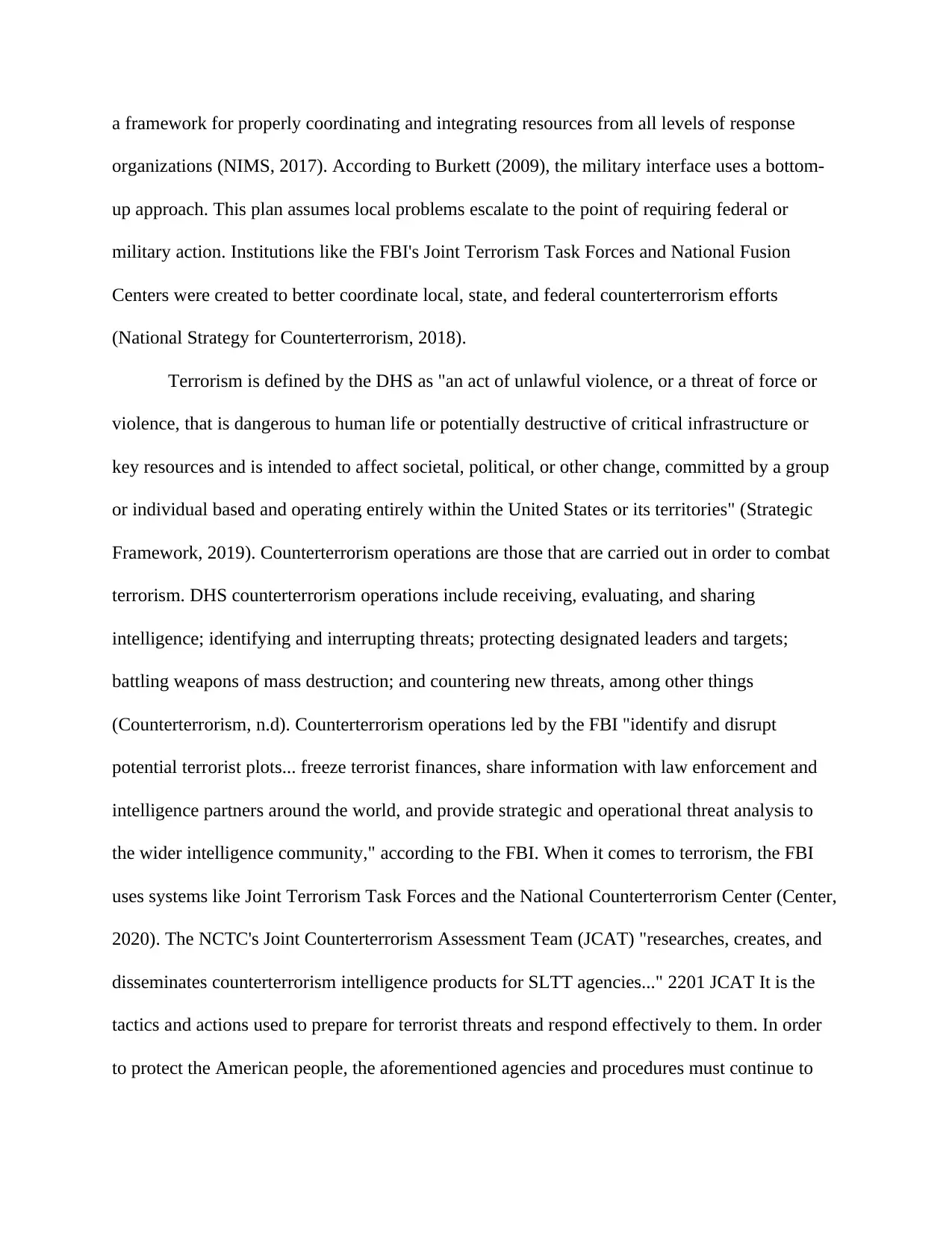
a framework for properly coordinating and integrating resources from all levels of response
organizations (NIMS, 2017). According to Burkett (2009), the military interface uses a bottom-
up approach. This plan assumes local problems escalate to the point of requiring federal or
military action. Institutions like the FBI's Joint Terrorism Task Forces and National Fusion
Centers were created to better coordinate local, state, and federal counterterrorism efforts
(National Strategy for Counterterrorism, 2018).
Terrorism is defined by the DHS as "an act of unlawful violence, or a threat of force or
violence, that is dangerous to human life or potentially destructive of critical infrastructure or
key resources and is intended to affect societal, political, or other change, committed by a group
or individual based and operating entirely within the United States or its territories" (Strategic
Framework, 2019). Counterterrorism operations are those that are carried out in order to combat
terrorism. DHS counterterrorism operations include receiving, evaluating, and sharing
intelligence; identifying and interrupting threats; protecting designated leaders and targets;
battling weapons of mass destruction; and countering new threats, among other things
(Counterterrorism, n.d). Counterterrorism operations led by the FBI "identify and disrupt
potential terrorist plots... freeze terrorist finances, share information with law enforcement and
intelligence partners around the world, and provide strategic and operational threat analysis to
the wider intelligence community," according to the FBI. When it comes to terrorism, the FBI
uses systems like Joint Terrorism Task Forces and the National Counterterrorism Center (Center,
2020). The NCTC's Joint Counterterrorism Assessment Team (JCAT) "researches, creates, and
disseminates counterterrorism intelligence products for SLTT agencies..." 2201 JCAT It is the
tactics and actions used to prepare for terrorist threats and respond effectively to them. In order
to protect the American people, the aforementioned agencies and procedures must continue to
organizations (NIMS, 2017). According to Burkett (2009), the military interface uses a bottom-
up approach. This plan assumes local problems escalate to the point of requiring federal or
military action. Institutions like the FBI's Joint Terrorism Task Forces and National Fusion
Centers were created to better coordinate local, state, and federal counterterrorism efforts
(National Strategy for Counterterrorism, 2018).
Terrorism is defined by the DHS as "an act of unlawful violence, or a threat of force or
violence, that is dangerous to human life or potentially destructive of critical infrastructure or
key resources and is intended to affect societal, political, or other change, committed by a group
or individual based and operating entirely within the United States or its territories" (Strategic
Framework, 2019). Counterterrorism operations are those that are carried out in order to combat
terrorism. DHS counterterrorism operations include receiving, evaluating, and sharing
intelligence; identifying and interrupting threats; protecting designated leaders and targets;
battling weapons of mass destruction; and countering new threats, among other things
(Counterterrorism, n.d). Counterterrorism operations led by the FBI "identify and disrupt
potential terrorist plots... freeze terrorist finances, share information with law enforcement and
intelligence partners around the world, and provide strategic and operational threat analysis to
the wider intelligence community," according to the FBI. When it comes to terrorism, the FBI
uses systems like Joint Terrorism Task Forces and the National Counterterrorism Center (Center,
2020). The NCTC's Joint Counterterrorism Assessment Team (JCAT) "researches, creates, and
disseminates counterterrorism intelligence products for SLTT agencies..." 2201 JCAT It is the
tactics and actions used to prepare for terrorist threats and respond effectively to them. In order
to protect the American people, the aforementioned agencies and procedures must continue to
⊘ This is a preview!⊘
Do you want full access?
Subscribe today to unlock all pages.

Trusted by 1+ million students worldwide
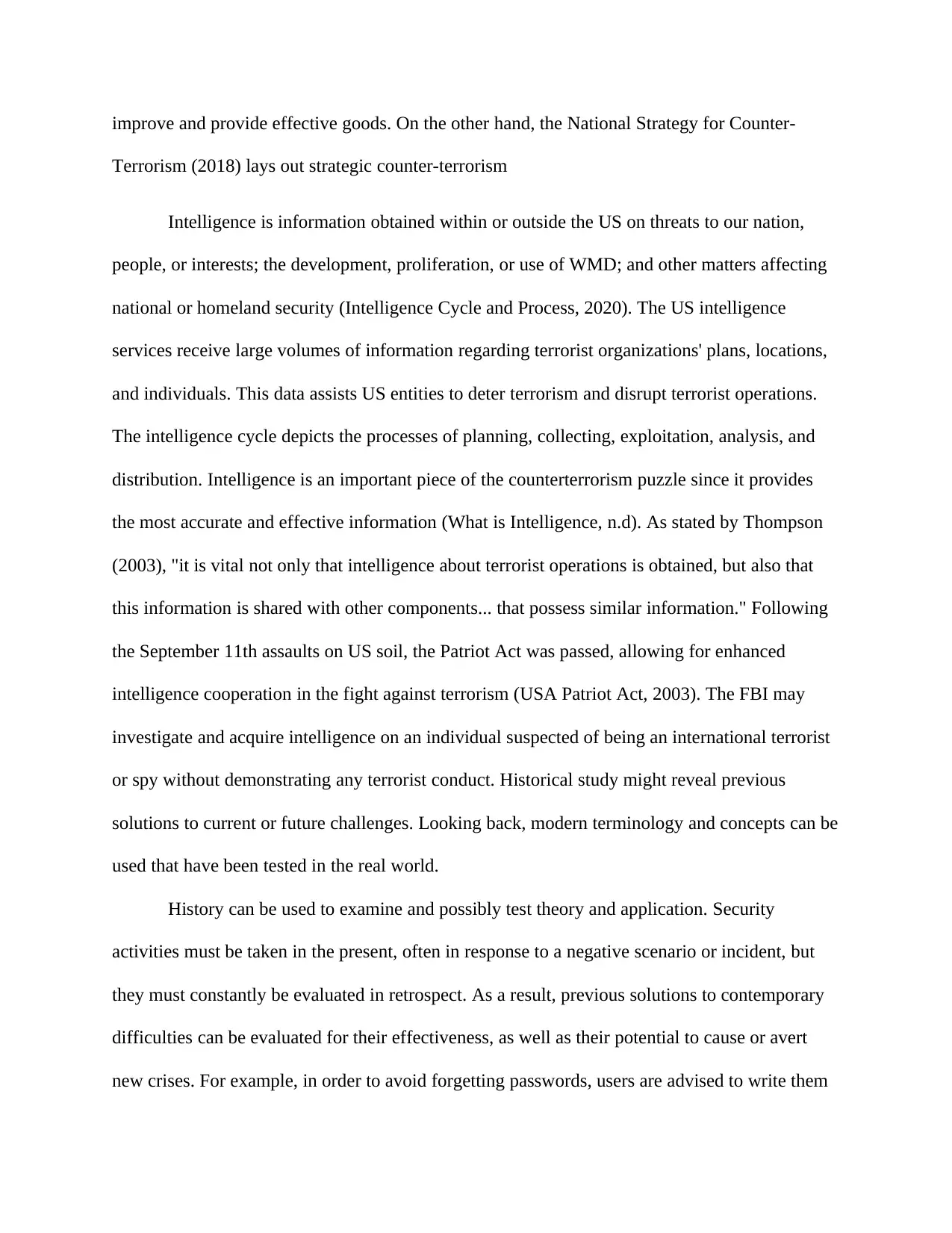
improve and provide effective goods. On the other hand, the National Strategy for Counter-
Terrorism (2018) lays out strategic counter-terrorism
Intelligence is information obtained within or outside the US on threats to our nation,
people, or interests; the development, proliferation, or use of WMD; and other matters affecting
national or homeland security (Intelligence Cycle and Process, 2020). The US intelligence
services receive large volumes of information regarding terrorist organizations' plans, locations,
and individuals. This data assists US entities to deter terrorism and disrupt terrorist operations.
The intelligence cycle depicts the processes of planning, collecting, exploitation, analysis, and
distribution. Intelligence is an important piece of the counterterrorism puzzle since it provides
the most accurate and effective information (What is Intelligence, n.d). As stated by Thompson
(2003), "it is vital not only that intelligence about terrorist operations is obtained, but also that
this information is shared with other components... that possess similar information." Following
the September 11th assaults on US soil, the Patriot Act was passed, allowing for enhanced
intelligence cooperation in the fight against terrorism (USA Patriot Act, 2003). The FBI may
investigate and acquire intelligence on an individual suspected of being an international terrorist
or spy without demonstrating any terrorist conduct. Historical study might reveal previous
solutions to current or future challenges. Looking back, modern terminology and concepts can be
used that have been tested in the real world.
History can be used to examine and possibly test theory and application. Security
activities must be taken in the present, often in response to a negative scenario or incident, but
they must constantly be evaluated in retrospect. As a result, previous solutions to contemporary
difficulties can be evaluated for their effectiveness, as well as their potential to cause or avert
new crises. For example, in order to avoid forgetting passwords, users are advised to write them
Terrorism (2018) lays out strategic counter-terrorism
Intelligence is information obtained within or outside the US on threats to our nation,
people, or interests; the development, proliferation, or use of WMD; and other matters affecting
national or homeland security (Intelligence Cycle and Process, 2020). The US intelligence
services receive large volumes of information regarding terrorist organizations' plans, locations,
and individuals. This data assists US entities to deter terrorism and disrupt terrorist operations.
The intelligence cycle depicts the processes of planning, collecting, exploitation, analysis, and
distribution. Intelligence is an important piece of the counterterrorism puzzle since it provides
the most accurate and effective information (What is Intelligence, n.d). As stated by Thompson
(2003), "it is vital not only that intelligence about terrorist operations is obtained, but also that
this information is shared with other components... that possess similar information." Following
the September 11th assaults on US soil, the Patriot Act was passed, allowing for enhanced
intelligence cooperation in the fight against terrorism (USA Patriot Act, 2003). The FBI may
investigate and acquire intelligence on an individual suspected of being an international terrorist
or spy without demonstrating any terrorist conduct. Historical study might reveal previous
solutions to current or future challenges. Looking back, modern terminology and concepts can be
used that have been tested in the real world.
History can be used to examine and possibly test theory and application. Security
activities must be taken in the present, often in response to a negative scenario or incident, but
they must constantly be evaluated in retrospect. As a result, previous solutions to contemporary
difficulties can be evaluated for their effectiveness, as well as their potential to cause or avert
new crises. For example, in order to avoid forgetting passwords, users are advised to write them
Paraphrase This Document
Need a fresh take? Get an instant paraphrase of this document with our AI Paraphraser
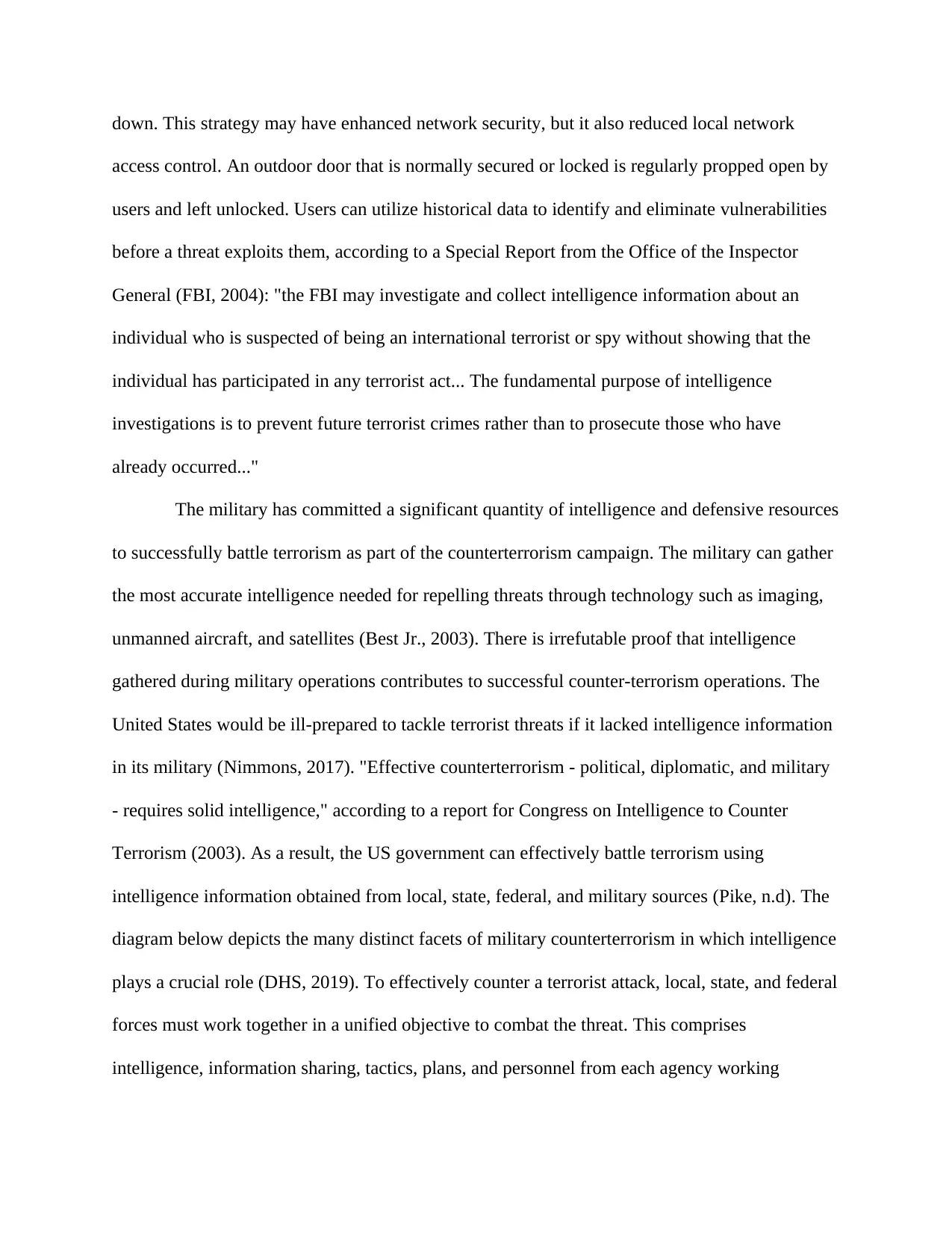
down. This strategy may have enhanced network security, but it also reduced local network
access control. An outdoor door that is normally secured or locked is regularly propped open by
users and left unlocked. Users can utilize historical data to identify and eliminate vulnerabilities
before a threat exploits them, according to a Special Report from the Office of the Inspector
General (FBI, 2004): "the FBI may investigate and collect intelligence information about an
individual who is suspected of being an international terrorist or spy without showing that the
individual has participated in any terrorist act... The fundamental purpose of intelligence
investigations is to prevent future terrorist crimes rather than to prosecute those who have
already occurred..."
The military has committed a significant quantity of intelligence and defensive resources
to successfully battle terrorism as part of the counterterrorism campaign. The military can gather
the most accurate intelligence needed for repelling threats through technology such as imaging,
unmanned aircraft, and satellites (Best Jr., 2003). There is irrefutable proof that intelligence
gathered during military operations contributes to successful counter-terrorism operations. The
United States would be ill-prepared to tackle terrorist threats if it lacked intelligence information
in its military (Nimmons, 2017). "Effective counterterrorism - political, diplomatic, and military
- requires solid intelligence," according to a report for Congress on Intelligence to Counter
Terrorism (2003). As a result, the US government can effectively battle terrorism using
intelligence information obtained from local, state, federal, and military sources (Pike, n.d). The
diagram below depicts the many distinct facets of military counterterrorism in which intelligence
plays a crucial role (DHS, 2019). To effectively counter a terrorist attack, local, state, and federal
forces must work together in a unified objective to combat the threat. This comprises
intelligence, information sharing, tactics, plans, and personnel from each agency working
access control. An outdoor door that is normally secured or locked is regularly propped open by
users and left unlocked. Users can utilize historical data to identify and eliminate vulnerabilities
before a threat exploits them, according to a Special Report from the Office of the Inspector
General (FBI, 2004): "the FBI may investigate and collect intelligence information about an
individual who is suspected of being an international terrorist or spy without showing that the
individual has participated in any terrorist act... The fundamental purpose of intelligence
investigations is to prevent future terrorist crimes rather than to prosecute those who have
already occurred..."
The military has committed a significant quantity of intelligence and defensive resources
to successfully battle terrorism as part of the counterterrorism campaign. The military can gather
the most accurate intelligence needed for repelling threats through technology such as imaging,
unmanned aircraft, and satellites (Best Jr., 2003). There is irrefutable proof that intelligence
gathered during military operations contributes to successful counter-terrorism operations. The
United States would be ill-prepared to tackle terrorist threats if it lacked intelligence information
in its military (Nimmons, 2017). "Effective counterterrorism - political, diplomatic, and military
- requires solid intelligence," according to a report for Congress on Intelligence to Counter
Terrorism (2003). As a result, the US government can effectively battle terrorism using
intelligence information obtained from local, state, federal, and military sources (Pike, n.d). The
diagram below depicts the many distinct facets of military counterterrorism in which intelligence
plays a crucial role (DHS, 2019). To effectively counter a terrorist attack, local, state, and federal
forces must work together in a unified objective to combat the threat. This comprises
intelligence, information sharing, tactics, plans, and personnel from each agency working
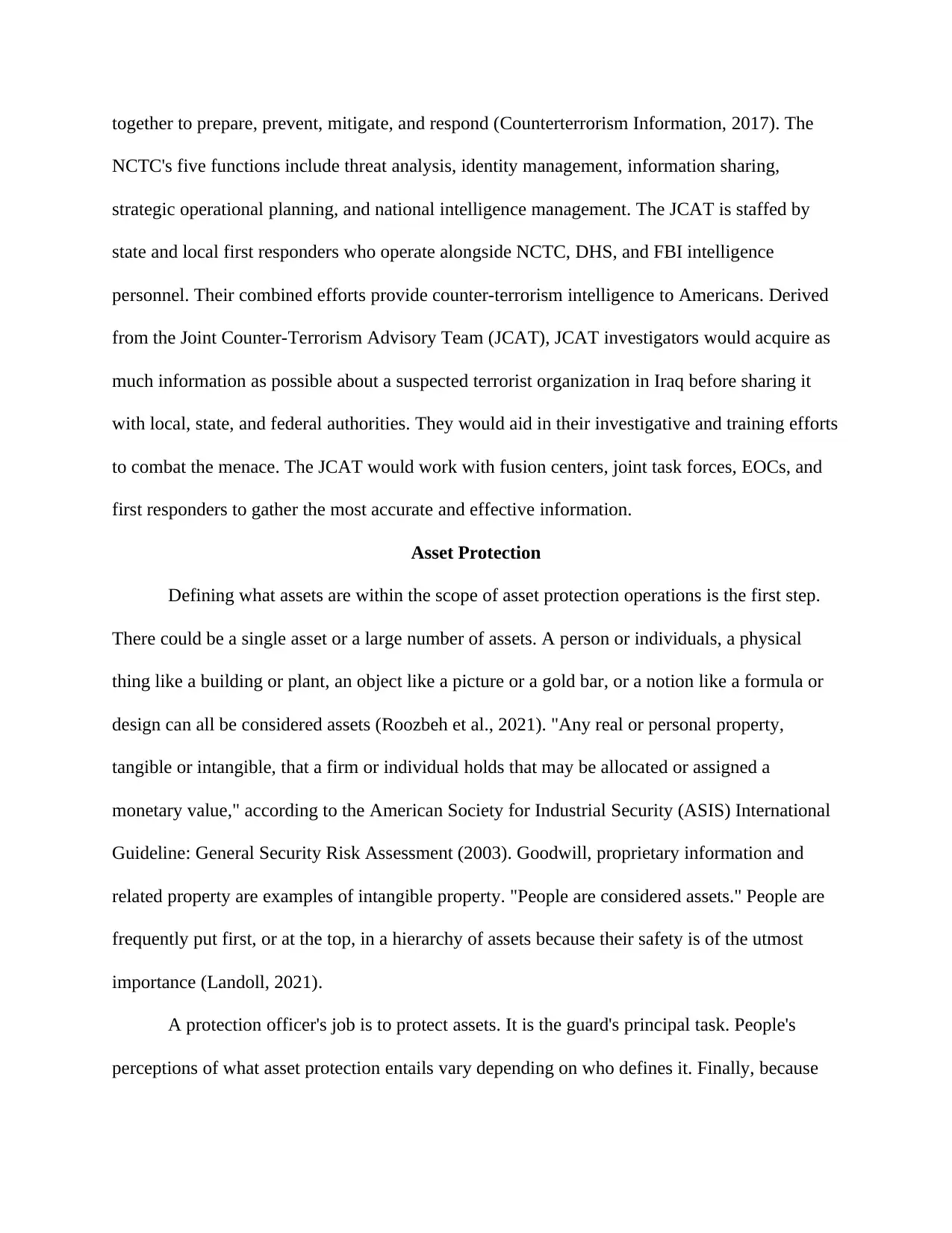
together to prepare, prevent, mitigate, and respond (Counterterrorism Information, 2017). The
NCTC's five functions include threat analysis, identity management, information sharing,
strategic operational planning, and national intelligence management. The JCAT is staffed by
state and local first responders who operate alongside NCTC, DHS, and FBI intelligence
personnel. Their combined efforts provide counter-terrorism intelligence to Americans. Derived
from the Joint Counter-Terrorism Advisory Team (JCAT), JCAT investigators would acquire as
much information as possible about a suspected terrorist organization in Iraq before sharing it
with local, state, and federal authorities. They would aid in their investigative and training efforts
to combat the menace. The JCAT would work with fusion centers, joint task forces, EOCs, and
first responders to gather the most accurate and effective information.
Asset Protection
Defining what assets are within the scope of asset protection operations is the first step.
There could be a single asset or a large number of assets. A person or individuals, a physical
thing like a building or plant, an object like a picture or a gold bar, or a notion like a formula or
design can all be considered assets (Roozbeh et al., 2021). "Any real or personal property,
tangible or intangible, that a firm or individual holds that may be allocated or assigned a
monetary value," according to the American Society for Industrial Security (ASIS) International
Guideline: General Security Risk Assessment (2003). Goodwill, proprietary information and
related property are examples of intangible property. "People are considered assets." People are
frequently put first, or at the top, in a hierarchy of assets because their safety is of the utmost
importance (Landoll, 2021).
A protection officer's job is to protect assets. It is the guard's principal task. People's
perceptions of what asset protection entails vary depending on who defines it. Finally, because
NCTC's five functions include threat analysis, identity management, information sharing,
strategic operational planning, and national intelligence management. The JCAT is staffed by
state and local first responders who operate alongside NCTC, DHS, and FBI intelligence
personnel. Their combined efforts provide counter-terrorism intelligence to Americans. Derived
from the Joint Counter-Terrorism Advisory Team (JCAT), JCAT investigators would acquire as
much information as possible about a suspected terrorist organization in Iraq before sharing it
with local, state, and federal authorities. They would aid in their investigative and training efforts
to combat the menace. The JCAT would work with fusion centers, joint task forces, EOCs, and
first responders to gather the most accurate and effective information.
Asset Protection
Defining what assets are within the scope of asset protection operations is the first step.
There could be a single asset or a large number of assets. A person or individuals, a physical
thing like a building or plant, an object like a picture or a gold bar, or a notion like a formula or
design can all be considered assets (Roozbeh et al., 2021). "Any real or personal property,
tangible or intangible, that a firm or individual holds that may be allocated or assigned a
monetary value," according to the American Society for Industrial Security (ASIS) International
Guideline: General Security Risk Assessment (2003). Goodwill, proprietary information and
related property are examples of intangible property. "People are considered assets." People are
frequently put first, or at the top, in a hierarchy of assets because their safety is of the utmost
importance (Landoll, 2021).
A protection officer's job is to protect assets. It is the guard's principal task. People's
perceptions of what asset protection entails vary depending on who defines it. Finally, because
⊘ This is a preview!⊘
Do you want full access?
Subscribe today to unlock all pages.

Trusted by 1+ million students worldwide
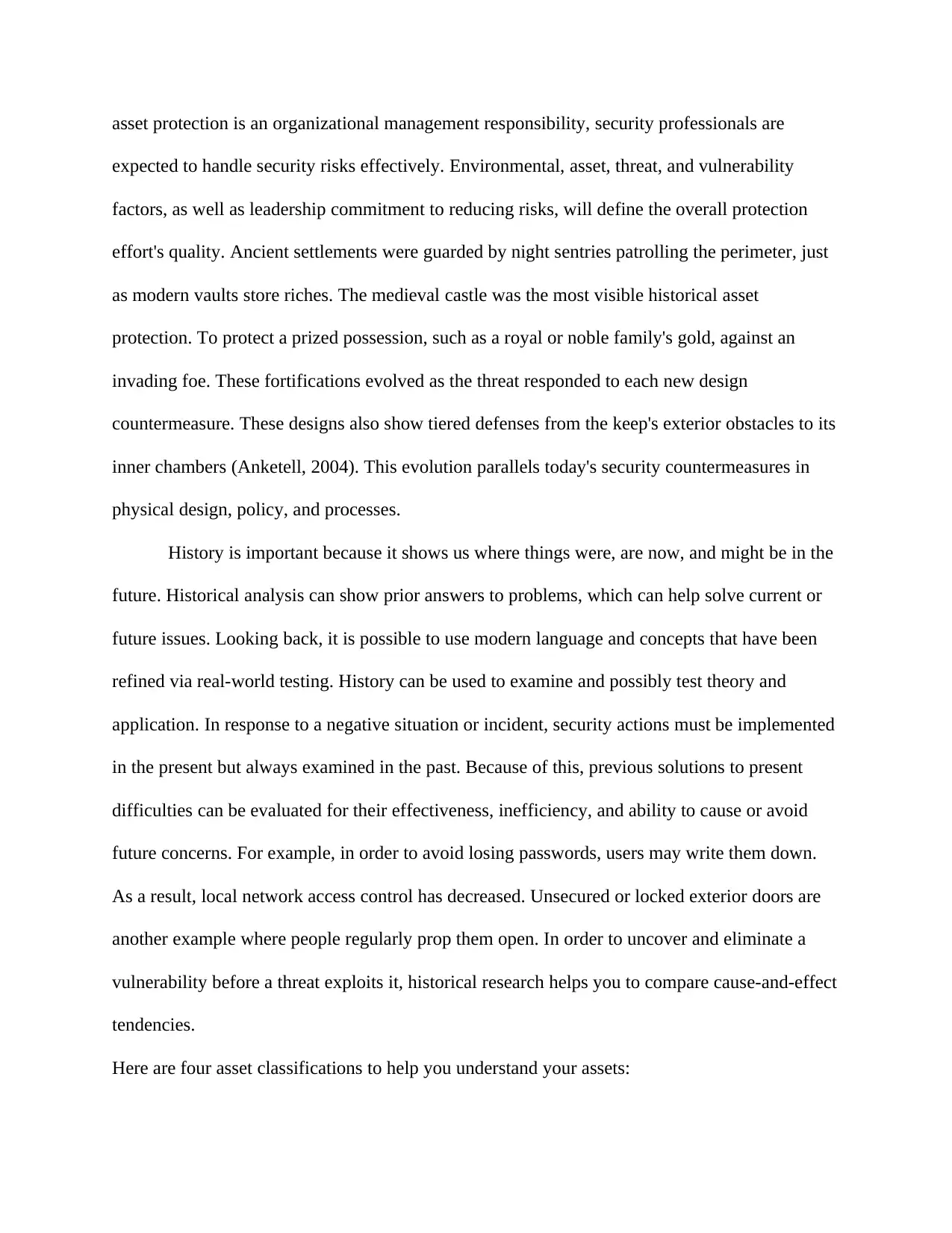
asset protection is an organizational management responsibility, security professionals are
expected to handle security risks effectively. Environmental, asset, threat, and vulnerability
factors, as well as leadership commitment to reducing risks, will define the overall protection
effort's quality. Ancient settlements were guarded by night sentries patrolling the perimeter, just
as modern vaults store riches. The medieval castle was the most visible historical asset
protection. To protect a prized possession, such as a royal or noble family's gold, against an
invading foe. These fortifications evolved as the threat responded to each new design
countermeasure. These designs also show tiered defenses from the keep's exterior obstacles to its
inner chambers (Anketell, 2004). This evolution parallels today's security countermeasures in
physical design, policy, and processes.
History is important because it shows us where things were, are now, and might be in the
future. Historical analysis can show prior answers to problems, which can help solve current or
future issues. Looking back, it is possible to use modern language and concepts that have been
refined via real-world testing. History can be used to examine and possibly test theory and
application. In response to a negative situation or incident, security actions must be implemented
in the present but always examined in the past. Because of this, previous solutions to present
difficulties can be evaluated for their effectiveness, inefficiency, and ability to cause or avoid
future concerns. For example, in order to avoid losing passwords, users may write them down.
As a result, local network access control has decreased. Unsecured or locked exterior doors are
another example where people regularly prop them open. In order to uncover and eliminate a
vulnerability before a threat exploits it, historical research helps you to compare cause-and-effect
tendencies.
Here are four asset classifications to help you understand your assets:
expected to handle security risks effectively. Environmental, asset, threat, and vulnerability
factors, as well as leadership commitment to reducing risks, will define the overall protection
effort's quality. Ancient settlements were guarded by night sentries patrolling the perimeter, just
as modern vaults store riches. The medieval castle was the most visible historical asset
protection. To protect a prized possession, such as a royal or noble family's gold, against an
invading foe. These fortifications evolved as the threat responded to each new design
countermeasure. These designs also show tiered defenses from the keep's exterior obstacles to its
inner chambers (Anketell, 2004). This evolution parallels today's security countermeasures in
physical design, policy, and processes.
History is important because it shows us where things were, are now, and might be in the
future. Historical analysis can show prior answers to problems, which can help solve current or
future issues. Looking back, it is possible to use modern language and concepts that have been
refined via real-world testing. History can be used to examine and possibly test theory and
application. In response to a negative situation or incident, security actions must be implemented
in the present but always examined in the past. Because of this, previous solutions to present
difficulties can be evaluated for their effectiveness, inefficiency, and ability to cause or avoid
future concerns. For example, in order to avoid losing passwords, users may write them down.
As a result, local network access control has decreased. Unsecured or locked exterior doors are
another example where people regularly prop them open. In order to uncover and eliminate a
vulnerability before a threat exploits it, historical research helps you to compare cause-and-effect
tendencies.
Here are four asset classifications to help you understand your assets:
Paraphrase This Document
Need a fresh take? Get an instant paraphrase of this document with our AI Paraphraser
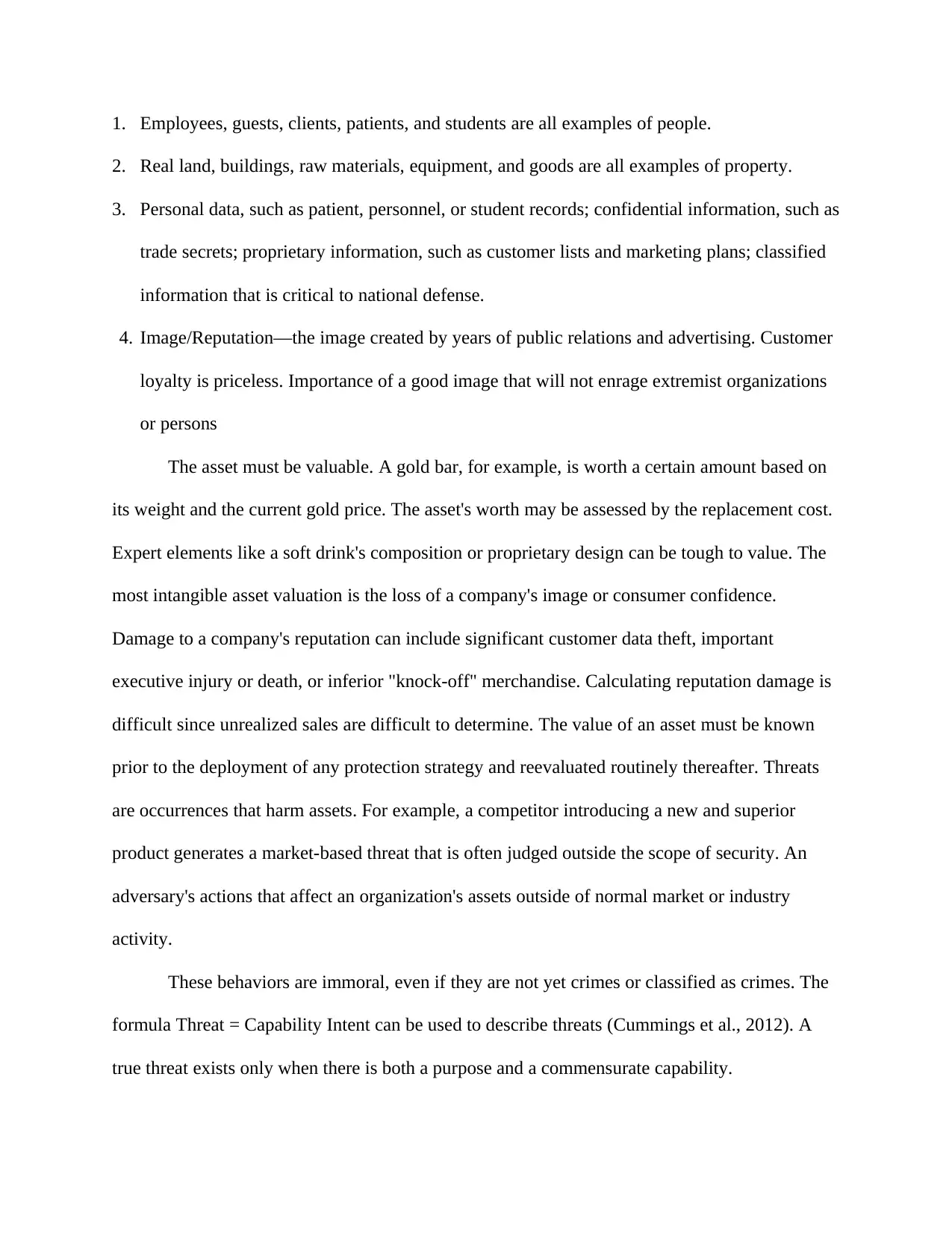
1. Employees, guests, clients, patients, and students are all examples of people.
2. Real land, buildings, raw materials, equipment, and goods are all examples of property.
3. Personal data, such as patient, personnel, or student records; confidential information, such as
trade secrets; proprietary information, such as customer lists and marketing plans; classified
information that is critical to national defense.
4. Image/Reputation—the image created by years of public relations and advertising. Customer
loyalty is priceless. Importance of a good image that will not enrage extremist organizations
or persons
The asset must be valuable. A gold bar, for example, is worth a certain amount based on
its weight and the current gold price. The asset's worth may be assessed by the replacement cost.
Expert elements like a soft drink's composition or proprietary design can be tough to value. The
most intangible asset valuation is the loss of a company's image or consumer confidence.
Damage to a company's reputation can include significant customer data theft, important
executive injury or death, or inferior "knock-off" merchandise. Calculating reputation damage is
difficult since unrealized sales are difficult to determine. The value of an asset must be known
prior to the deployment of any protection strategy and reevaluated routinely thereafter. Threats
are occurrences that harm assets. For example, a competitor introducing a new and superior
product generates a market-based threat that is often judged outside the scope of security. An
adversary's actions that affect an organization's assets outside of normal market or industry
activity.
These behaviors are immoral, even if they are not yet crimes or classified as crimes. The
formula Threat = Capability Intent can be used to describe threats (Cummings et al., 2012). A
true threat exists only when there is both a purpose and a commensurate capability.
2. Real land, buildings, raw materials, equipment, and goods are all examples of property.
3. Personal data, such as patient, personnel, or student records; confidential information, such as
trade secrets; proprietary information, such as customer lists and marketing plans; classified
information that is critical to national defense.
4. Image/Reputation—the image created by years of public relations and advertising. Customer
loyalty is priceless. Importance of a good image that will not enrage extremist organizations
or persons
The asset must be valuable. A gold bar, for example, is worth a certain amount based on
its weight and the current gold price. The asset's worth may be assessed by the replacement cost.
Expert elements like a soft drink's composition or proprietary design can be tough to value. The
most intangible asset valuation is the loss of a company's image or consumer confidence.
Damage to a company's reputation can include significant customer data theft, important
executive injury or death, or inferior "knock-off" merchandise. Calculating reputation damage is
difficult since unrealized sales are difficult to determine. The value of an asset must be known
prior to the deployment of any protection strategy and reevaluated routinely thereafter. Threats
are occurrences that harm assets. For example, a competitor introducing a new and superior
product generates a market-based threat that is often judged outside the scope of security. An
adversary's actions that affect an organization's assets outside of normal market or industry
activity.
These behaviors are immoral, even if they are not yet crimes or classified as crimes. The
formula Threat = Capability Intent can be used to describe threats (Cummings et al., 2012). A
true threat exists only when there is both a purpose and a commensurate capability.
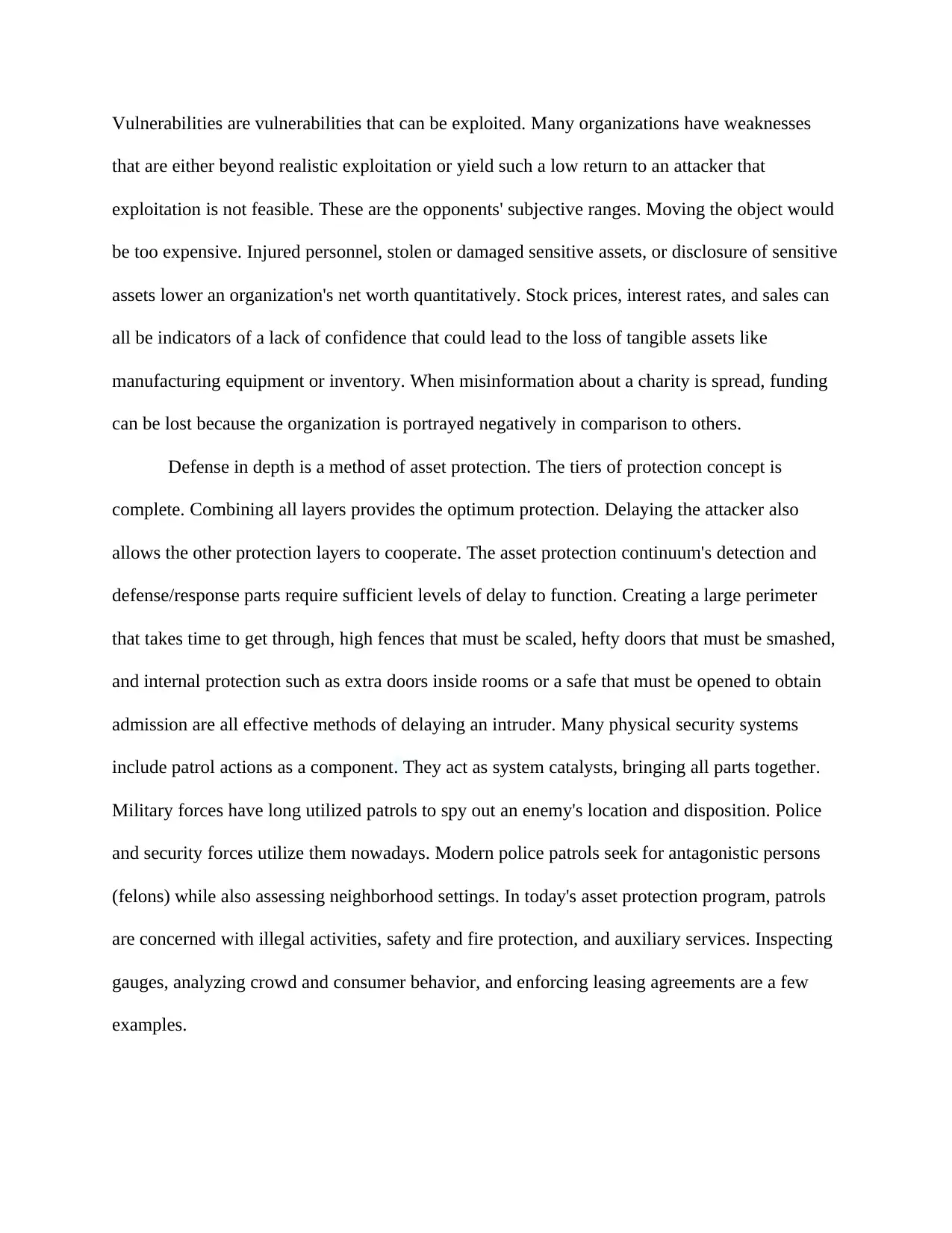
Vulnerabilities are vulnerabilities that can be exploited. Many organizations have weaknesses
that are either beyond realistic exploitation or yield such a low return to an attacker that
exploitation is not feasible. These are the opponents' subjective ranges. Moving the object would
be too expensive. Injured personnel, stolen or damaged sensitive assets, or disclosure of sensitive
assets lower an organization's net worth quantitatively. Stock prices, interest rates, and sales can
all be indicators of a lack of confidence that could lead to the loss of tangible assets like
manufacturing equipment or inventory. When misinformation about a charity is spread, funding
can be lost because the organization is portrayed negatively in comparison to others.
Defense in depth is a method of asset protection. The tiers of protection concept is
complete. Combining all layers provides the optimum protection. Delaying the attacker also
allows the other protection layers to cooperate. The asset protection continuum's detection and
defense/response parts require sufficient levels of delay to function. Creating a large perimeter
that takes time to get through, high fences that must be scaled, hefty doors that must be smashed,
and internal protection such as extra doors inside rooms or a safe that must be opened to obtain
admission are all effective methods of delaying an intruder. Many physical security systems
include patrol actions as a component. They act as system catalysts, bringing all parts together.
Military forces have long utilized patrols to spy out an enemy's location and disposition. Police
and security forces utilize them nowadays. Modern police patrols seek for antagonistic persons
(felons) while also assessing neighborhood settings. In today's asset protection program, patrols
are concerned with illegal activities, safety and fire protection, and auxiliary services. Inspecting
gauges, analyzing crowd and consumer behavior, and enforcing leasing agreements are a few
examples.
that are either beyond realistic exploitation or yield such a low return to an attacker that
exploitation is not feasible. These are the opponents' subjective ranges. Moving the object would
be too expensive. Injured personnel, stolen or damaged sensitive assets, or disclosure of sensitive
assets lower an organization's net worth quantitatively. Stock prices, interest rates, and sales can
all be indicators of a lack of confidence that could lead to the loss of tangible assets like
manufacturing equipment or inventory. When misinformation about a charity is spread, funding
can be lost because the organization is portrayed negatively in comparison to others.
Defense in depth is a method of asset protection. The tiers of protection concept is
complete. Combining all layers provides the optimum protection. Delaying the attacker also
allows the other protection layers to cooperate. The asset protection continuum's detection and
defense/response parts require sufficient levels of delay to function. Creating a large perimeter
that takes time to get through, high fences that must be scaled, hefty doors that must be smashed,
and internal protection such as extra doors inside rooms or a safe that must be opened to obtain
admission are all effective methods of delaying an intruder. Many physical security systems
include patrol actions as a component. They act as system catalysts, bringing all parts together.
Military forces have long utilized patrols to spy out an enemy's location and disposition. Police
and security forces utilize them nowadays. Modern police patrols seek for antagonistic persons
(felons) while also assessing neighborhood settings. In today's asset protection program, patrols
are concerned with illegal activities, safety and fire protection, and auxiliary services. Inspecting
gauges, analyzing crowd and consumer behavior, and enforcing leasing agreements are a few
examples.
⊘ This is a preview!⊘
Do you want full access?
Subscribe today to unlock all pages.

Trusted by 1+ million students worldwide
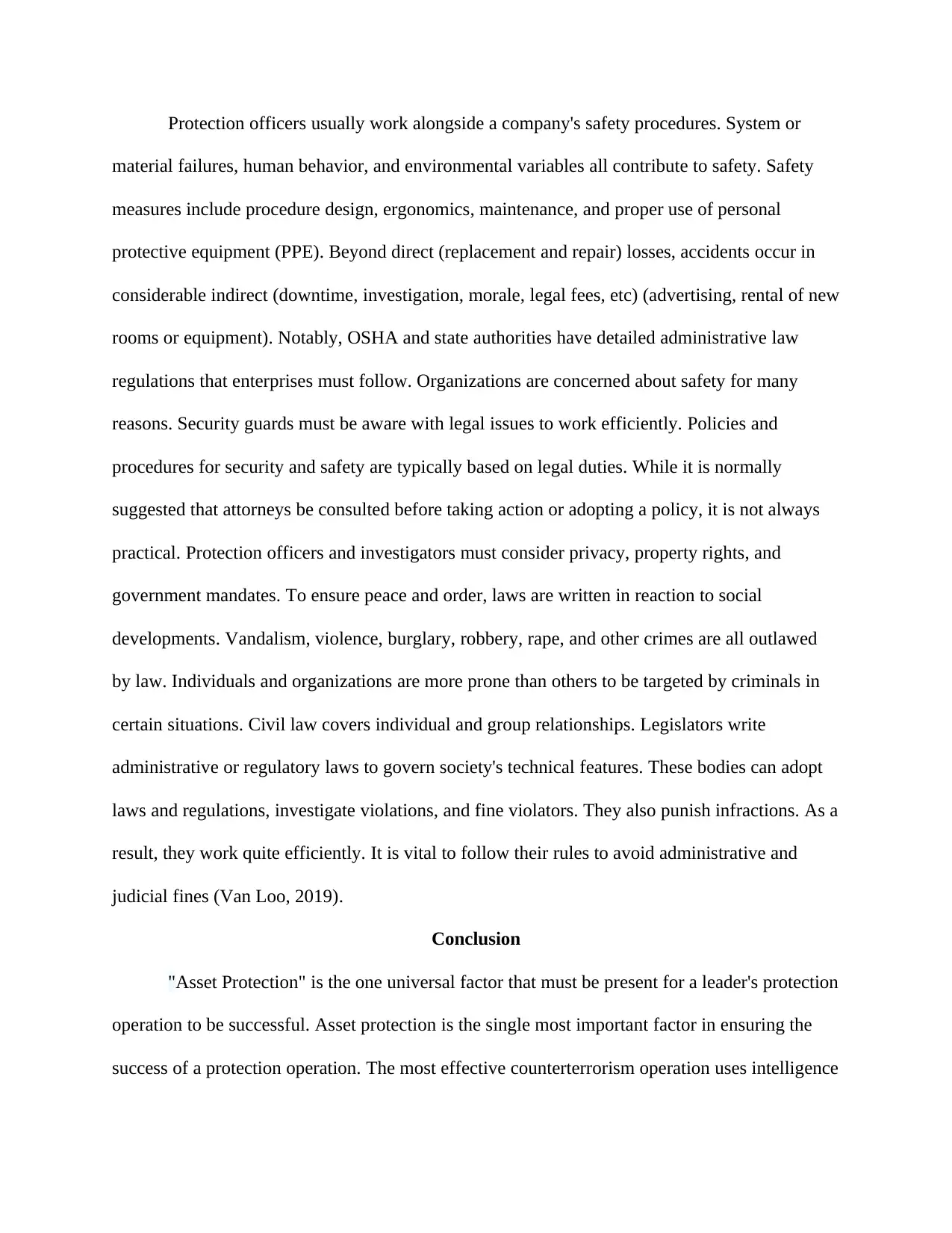
Protection officers usually work alongside a company's safety procedures. System or
material failures, human behavior, and environmental variables all contribute to safety. Safety
measures include procedure design, ergonomics, maintenance, and proper use of personal
protective equipment (PPE). Beyond direct (replacement and repair) losses, accidents occur in
considerable indirect (downtime, investigation, morale, legal fees, etc) (advertising, rental of new
rooms or equipment). Notably, OSHA and state authorities have detailed administrative law
regulations that enterprises must follow. Organizations are concerned about safety for many
reasons. Security guards must be aware with legal issues to work efficiently. Policies and
procedures for security and safety are typically based on legal duties. While it is normally
suggested that attorneys be consulted before taking action or adopting a policy, it is not always
practical. Protection officers and investigators must consider privacy, property rights, and
government mandates. To ensure peace and order, laws are written in reaction to social
developments. Vandalism, violence, burglary, robbery, rape, and other crimes are all outlawed
by law. Individuals and organizations are more prone than others to be targeted by criminals in
certain situations. Civil law covers individual and group relationships. Legislators write
administrative or regulatory laws to govern society's technical features. These bodies can adopt
laws and regulations, investigate violations, and fine violators. They also punish infractions. As a
result, they work quite efficiently. It is vital to follow their rules to avoid administrative and
judicial fines (Van Loo, 2019).
Conclusion
"Asset Protection" is the one universal factor that must be present for a leader's protection
operation to be successful. Asset protection is the single most important factor in ensuring the
success of a protection operation. The most effective counterterrorism operation uses intelligence
material failures, human behavior, and environmental variables all contribute to safety. Safety
measures include procedure design, ergonomics, maintenance, and proper use of personal
protective equipment (PPE). Beyond direct (replacement and repair) losses, accidents occur in
considerable indirect (downtime, investigation, morale, legal fees, etc) (advertising, rental of new
rooms or equipment). Notably, OSHA and state authorities have detailed administrative law
regulations that enterprises must follow. Organizations are concerned about safety for many
reasons. Security guards must be aware with legal issues to work efficiently. Policies and
procedures for security and safety are typically based on legal duties. While it is normally
suggested that attorneys be consulted before taking action or adopting a policy, it is not always
practical. Protection officers and investigators must consider privacy, property rights, and
government mandates. To ensure peace and order, laws are written in reaction to social
developments. Vandalism, violence, burglary, robbery, rape, and other crimes are all outlawed
by law. Individuals and organizations are more prone than others to be targeted by criminals in
certain situations. Civil law covers individual and group relationships. Legislators write
administrative or regulatory laws to govern society's technical features. These bodies can adopt
laws and regulations, investigate violations, and fine violators. They also punish infractions. As a
result, they work quite efficiently. It is vital to follow their rules to avoid administrative and
judicial fines (Van Loo, 2019).
Conclusion
"Asset Protection" is the one universal factor that must be present for a leader's protection
operation to be successful. Asset protection is the single most important factor in ensuring the
success of a protection operation. The most effective counterterrorism operation uses intelligence
Paraphrase This Document
Need a fresh take? Get an instant paraphrase of this document with our AI Paraphraser
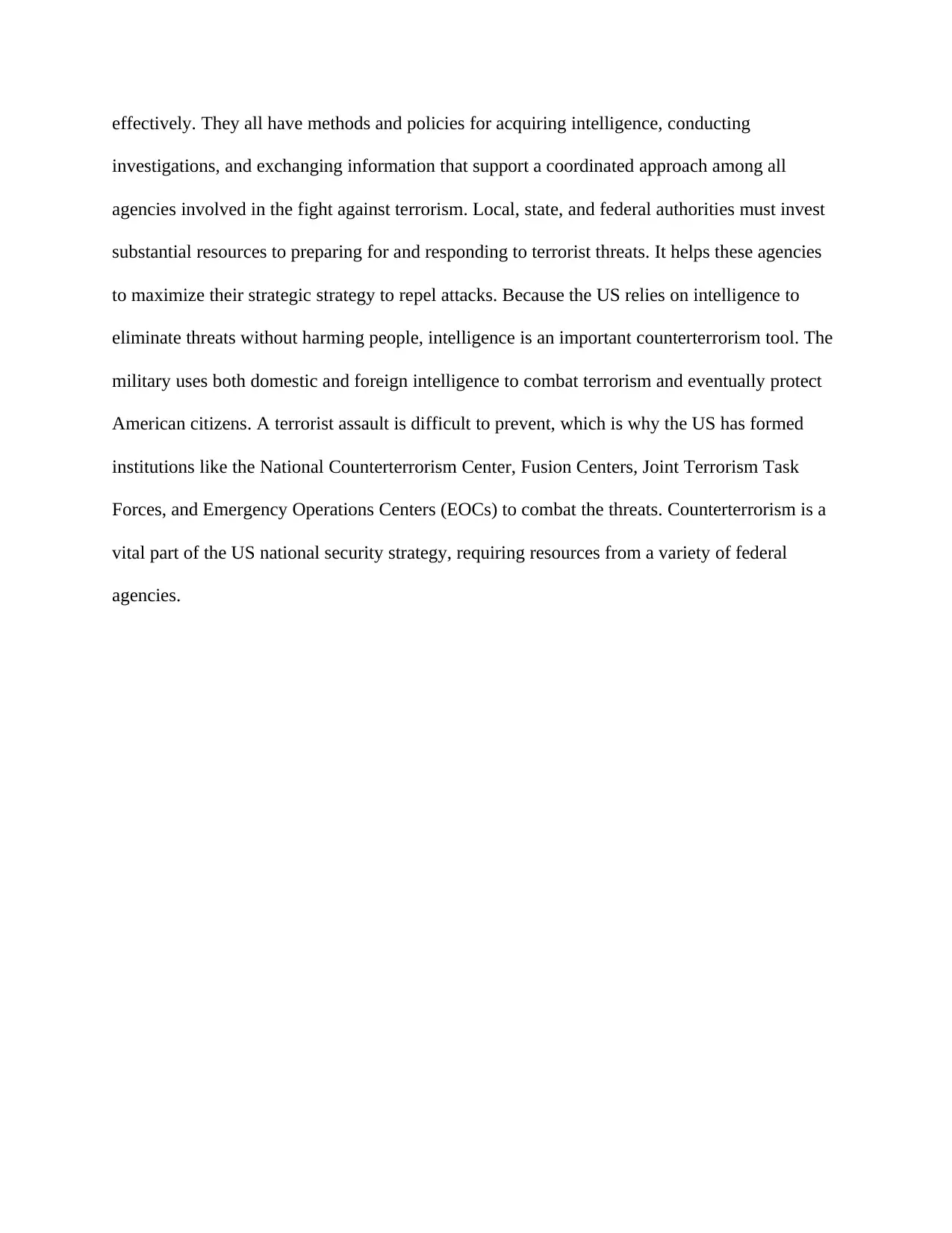
effectively. They all have methods and policies for acquiring intelligence, conducting
investigations, and exchanging information that support a coordinated approach among all
agencies involved in the fight against terrorism. Local, state, and federal authorities must invest
substantial resources to preparing for and responding to terrorist threats. It helps these agencies
to maximize their strategic strategy to repel attacks. Because the US relies on intelligence to
eliminate threats without harming people, intelligence is an important counterterrorism tool. The
military uses both domestic and foreign intelligence to combat terrorism and eventually protect
American citizens. A terrorist assault is difficult to prevent, which is why the US has formed
institutions like the National Counterterrorism Center, Fusion Centers, Joint Terrorism Task
Forces, and Emergency Operations Centers (EOCs) to combat the threats. Counterterrorism is a
vital part of the US national security strategy, requiring resources from a variety of federal
agencies.
investigations, and exchanging information that support a coordinated approach among all
agencies involved in the fight against terrorism. Local, state, and federal authorities must invest
substantial resources to preparing for and responding to terrorist threats. It helps these agencies
to maximize their strategic strategy to repel attacks. Because the US relies on intelligence to
eliminate threats without harming people, intelligence is an important counterterrorism tool. The
military uses both domestic and foreign intelligence to combat terrorism and eventually protect
American citizens. A terrorist assault is difficult to prevent, which is why the US has formed
institutions like the National Counterterrorism Center, Fusion Centers, Joint Terrorism Task
Forces, and Emergency Operations Centers (EOCs) to combat the threats. Counterterrorism is a
vital part of the US national security strategy, requiring resources from a variety of federal
agencies.
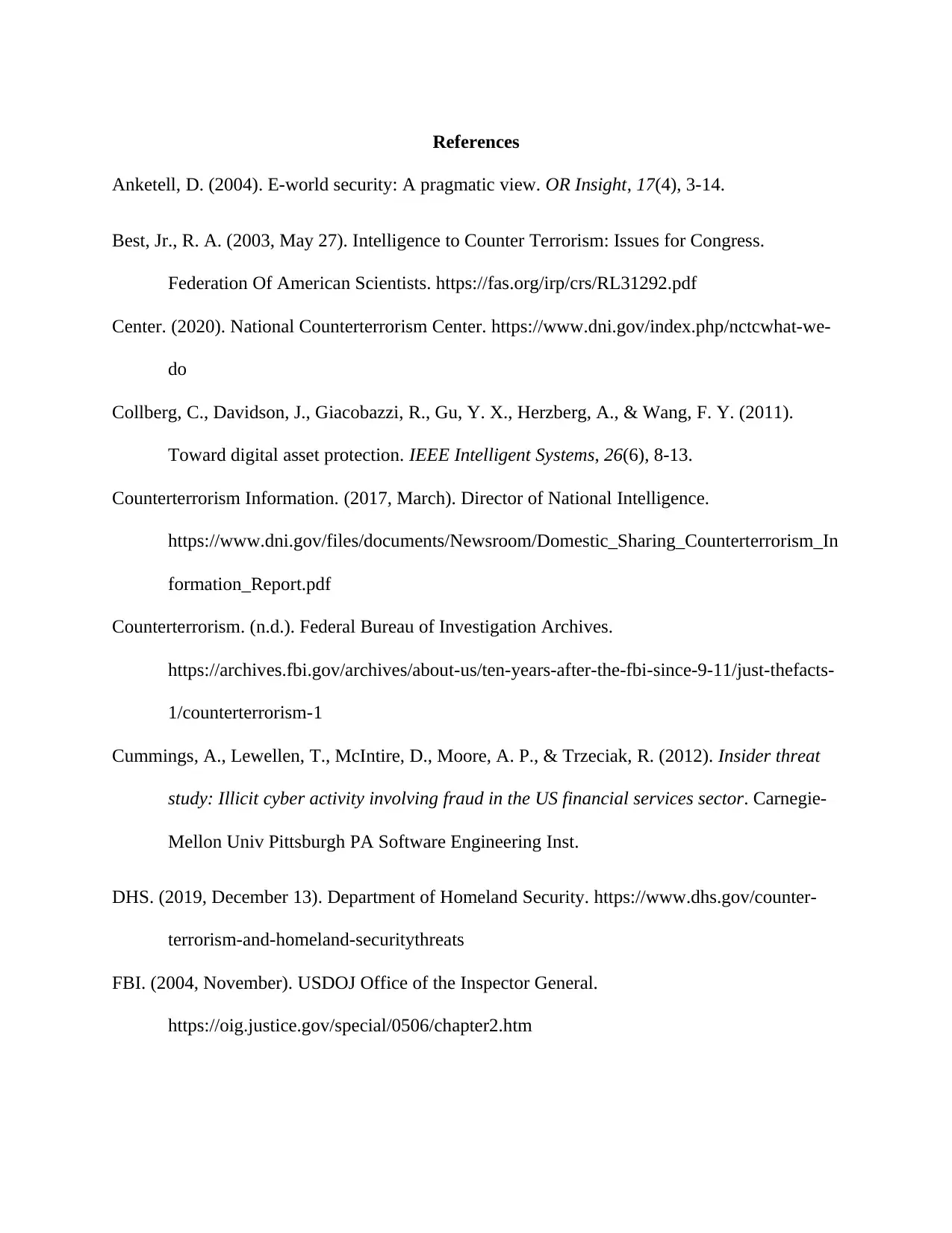
References
Anketell, D. (2004). E-world security: A pragmatic view. OR Insight, 17(4), 3-14.
Best, Jr., R. A. (2003, May 27). Intelligence to Counter Terrorism: Issues for Congress.
Federation Of American Scientists. https://fas.org/irp/crs/RL31292.pdf
Center. (2020). National Counterterrorism Center. https://www.dni.gov/index.php/nctcwhat-we-
do
Collberg, C., Davidson, J., Giacobazzi, R., Gu, Y. X., Herzberg, A., & Wang, F. Y. (2011).
Toward digital asset protection. IEEE Intelligent Systems, 26(6), 8-13.
Counterterrorism Information. (2017, March). Director of National Intelligence.
https://www.dni.gov/files/documents/Newsroom/Domestic_Sharing_Counterterrorism_In
formation_Report.pdf
Counterterrorism. (n.d.). Federal Bureau of Investigation Archives.
https://archives.fbi.gov/archives/about-us/ten-years-after-the-fbi-since-9-11/just-thefacts-
1/counterterrorism-1
Cummings, A., Lewellen, T., McIntire, D., Moore, A. P., & Trzeciak, R. (2012). Insider threat
study: Illicit cyber activity involving fraud in the US financial services sector. Carnegie-
Mellon Univ Pittsburgh PA Software Engineering Inst.
DHS. (2019, December 13). Department of Homeland Security. https://www.dhs.gov/counter-
terrorism-and-homeland-securitythreats
FBI. (2004, November). USDOJ Office of the Inspector General.
https://oig.justice.gov/special/0506/chapter2.htm
Anketell, D. (2004). E-world security: A pragmatic view. OR Insight, 17(4), 3-14.
Best, Jr., R. A. (2003, May 27). Intelligence to Counter Terrorism: Issues for Congress.
Federation Of American Scientists. https://fas.org/irp/crs/RL31292.pdf
Center. (2020). National Counterterrorism Center. https://www.dni.gov/index.php/nctcwhat-we-
do
Collberg, C., Davidson, J., Giacobazzi, R., Gu, Y. X., Herzberg, A., & Wang, F. Y. (2011).
Toward digital asset protection. IEEE Intelligent Systems, 26(6), 8-13.
Counterterrorism Information. (2017, March). Director of National Intelligence.
https://www.dni.gov/files/documents/Newsroom/Domestic_Sharing_Counterterrorism_In
formation_Report.pdf
Counterterrorism. (n.d.). Federal Bureau of Investigation Archives.
https://archives.fbi.gov/archives/about-us/ten-years-after-the-fbi-since-9-11/just-thefacts-
1/counterterrorism-1
Cummings, A., Lewellen, T., McIntire, D., Moore, A. P., & Trzeciak, R. (2012). Insider threat
study: Illicit cyber activity involving fraud in the US financial services sector. Carnegie-
Mellon Univ Pittsburgh PA Software Engineering Inst.
DHS. (2019, December 13). Department of Homeland Security. https://www.dhs.gov/counter-
terrorism-and-homeland-securitythreats
FBI. (2004, November). USDOJ Office of the Inspector General.
https://oig.justice.gov/special/0506/chapter2.htm
⊘ This is a preview!⊘
Do you want full access?
Subscribe today to unlock all pages.

Trusted by 1+ million students worldwide
1 out of 14
Your All-in-One AI-Powered Toolkit for Academic Success.
+13062052269
info@desklib.com
Available 24*7 on WhatsApp / Email
![[object Object]](/_next/static/media/star-bottom.7253800d.svg)
Unlock your academic potential
Copyright © 2020–2025 A2Z Services. All Rights Reserved. Developed and managed by ZUCOL.
